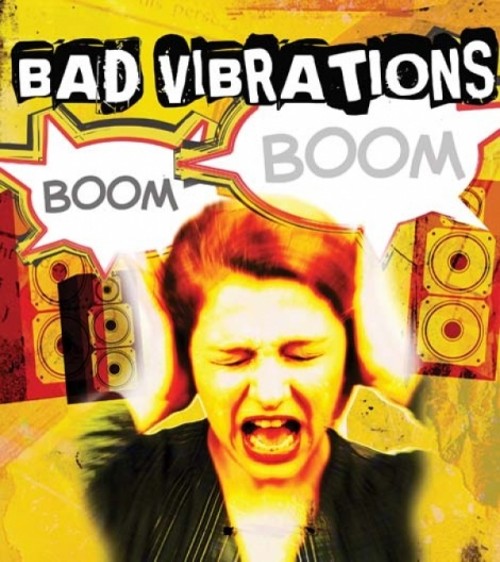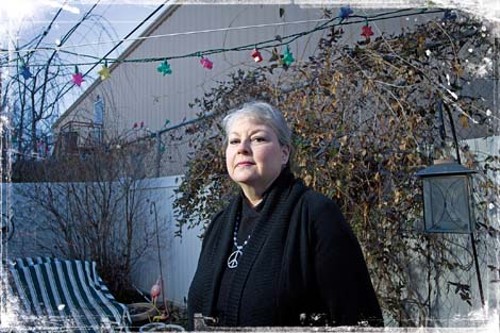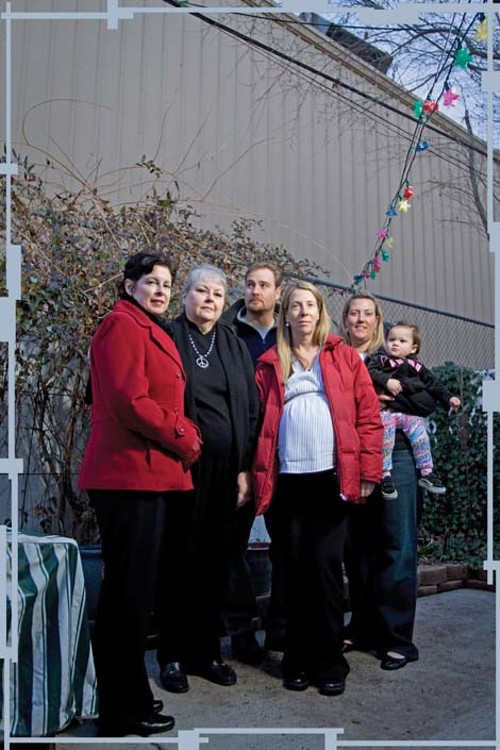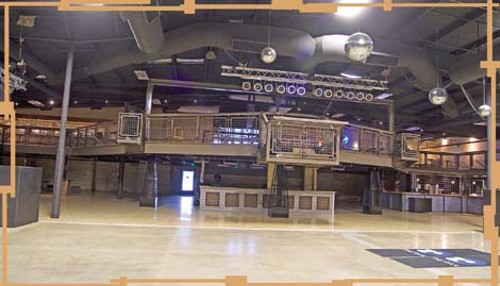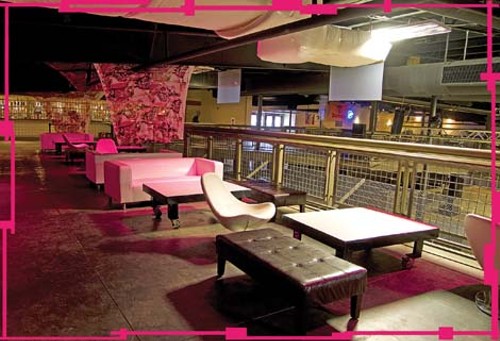The Rail's Bad Vibrations
New SLC venue The Rail faces confrontations with irate neighbors and a felonious past.
By Stephen Dark @stephenpdarkThe former residential-property developer knew he couldn’t go back to building homes. “Someone with a sexoffender conviction having the key to your house doesn’t work well,” he says.
So, he shifted to commercial development in the Guadalupe neighborhood in north Salt Lake City. He bought land adjacent to the railroad tracks in 2005 for $1.1 million, which was developed into offices and commercial space. Two years later, he purchased the adjoining warehouse and began renovating it into what would in 2009 become the multi-use venue The Rail Event Center (235 N. 500 West).
Before Gollaher, developers were afraid to enter an area blighted by drugs, boarded-up houses and graffiti, says Maria Garciaz, the executive director for the nonprofit NeighborWorks. Driving that point home, Gollaher recalls local Hispanic women hugging him in gratitude for investing in their neighborhood.
Other Rail neighbors, however, are far from thankful. For the previous six months, 58-year-old Carol McCracken (pictured at left) and many of her neighbors on a small, manicured cul-de-sac called Bliss Court have bombarded police dispatchers with complaints about noise from the tin-walled and-roofed Rail—which Gollaher describes as “a Taj Mahal with an edgy metal feel”—which has a capacity of 3,570 people and sits 10 feet from their back patio walls.
McCracken, whose home faces the back of The Rail, and the residents of 10 neighboring homes—among them a 28-year-old firefighter, a 65-year-old Navy veteran, and a couple with a 10-month-old baby—don’t necessarily want the multi-use venue shut down. After all, something worse could replace it. But they want their quiet back, qualified though it may be by the background hum of the neighboring freeway and railroad tracks. Those noises, however, are steadier, and the residents are accustomed to them. The noise of the 44,000-square-foot Rail, and particularly its bass vibration, is altogether different.
As McCracken e-mailed city officials in October last year, “We are literally being driven from our homes after 10 years of peace and quiet by a business that should never have been permitted to open a rock-concert venue 30 feet from our windows.”
At first sight, the strange saga of The Rail and its increasingly ill-tempered feud with its immediate neighbors comes down to what Salt Lake Valley Health compliance officer James Bennett described to a colleague in an e-mail as “poor planning” by Salt Lake City’s planning department. While The Rail is in the city’s jurisdiction—and its use is permitted because of its light-manufacturing zoning, according to Salt Lake City Mayor Ralph Becker—the county is responsible for noise issues.
In an October e-mail to county officials, Bennett wrote, “As we approach maximum build-out in Salt Lake County, these types of problems are going to continue unless the cities and the county start to look beyond the property lines at who these facilities might affect. I have seen too many cases of ‘let them build it, see what happens, and if there are problems call the Health Department.’ ” Look a little deeper, though, and a more complex picture emerges. On the fringes of the murky world of venue owners and concert promoters, two lives collided. One was convicted sex-offender Gollaher, a driving force behind The Rail. The other was paralegal and Bliss Court resident activist, McCracken, who ironically works with sex offenders and says the courts and society frequently mistreat them. Now, she’s the one who feels abused.
Gollaher says he is not hiding his past:
“I bought it, it’s part of who I am.” He tells everyone he meets about “my cancerous history.” On Jan. 19, 2010, that history caught up with him, when he was returned to prison for parole violations.
In or out of prison, McCracken doesn’t judge him, she just wants her restful nights back. No more nights of The Rail’s bass leaking into her home at 1 a.m., no more police officers standing in her home, telling her there’s nothing they can do.
Noise and Dissonance
While
its tin roof compounds The Rail’s noise issues, Gollaher’s record as a
convicted felon has provided fodder for opponents, not all of whom are
immediate neighbors. Most notably, a woman using a pseudonym has driven
investigations by city officials and state liquor agents, using
information that Rail owners suspect may have been provided by rival
club owners worried about the competition from the new venue.
The Rail’s current two principal managers and shareholders, painting contractor Scott Cook and attorney Blake Nakamura, were unprepared for what Nakamura terms “the underhanded efforts” used by as-yet unidentified forces to try to close them down. They lease the building that’s home to The Rail, renovated at a cost of as much as $9 million, from Gollaher’s wife, Sharon Western Gollaher, who declined an interview request. These efforts include, Nakamura says, “bogus noise complaints” and fliers soliciting noise complaints from Rail neighbors with business cards from a city engineer attached that, Nakamura says, were stolen. Gollaher suspects the hand of competing venue owners and Bliss Court homeowners (pictured at left) in such skullduggery, although nobody has been identified.
“We are literally being driven from our homes after 10 years of peace and quiet by a business that should never have been permitted to open a rock-concert venue 30 feet from our windows.”
While Gollaher’s past has been used against the club by others, Gollaher’s child-abuse conviction is a red herring for the sleep-deprived Bliss Court residents. The only question that matters to McCracken and her neighbors is whether The Rail is committed to finding a solution to the noise problem that, they say, is ruin ing their lives.
“Nobody wants to take the hit for screwing up here and, as a result, nobody wants to take responsibility for fixing it,” McCracken says. “Everyone is standing on the sidelines, wringing their hands and saying our neighborhood will never be the same. How sad.”
In just eight months since opening, The Rail has certainly made a splash. Offering good deals to nonprofits, it has held bashes for The Leonardo, public radio station KRCL and the 2010 Utah Census launch, and it also showcases the popular Friday Pure gay dance night. It provides part-time work for up to 75 local employees, including some who reside on Bliss Court. With the imminent construction of the North Temple airport TRAX line, the expansion north of the Gateway retail development just a few blocks away and Becker’s $100 million-plus North Temple development plan, The Rail could have a bright future. Not, though, if competitors or detractors have their way.
All The Rail has to do, McCracken says, is turn down the volume. “They need to give me my quiet back, and no one’s willing to do that.” McCracken’s neighbor Judy Ege takes antidepressants and anxiety medi cation
for post-traumatic stress disorder stemming from her service in the U.S. Navy. She can’t take much more of The Rail. “I can’t stand it,” she says. “It pounds into my soul.” She bows her head between her hands, staring blindly at the table.
Past Ghosts
The
twists and turns of the Rail story arguably began in 1978, when Cook
met Gollaher while both were serving a mission for The Church of Jesus
Christ of Latter-day Saints in Canada. Back in Utah, Gollaher managed a
cement and concrete business, while Cook and his brother ran painting
contractor Cook Bros.
Cook first learned Gollaher was a sex offender when his friend went to prison in 1996, after Gollaher was convicted of one count of sex abuse of a child, a seconddegree felony, for touching an 11-year-old girl’s genitals on a trampoline.
Although he initially denied the charge, Gollaher is forthcoming about it now. “I lied,” he says, close to tears. “This child did not lie.”
When Gollaher (pictured at left) got out of prison in 2004, “I didn’t stop and hide,” he says. His past has created problems for him and, as Cook found out with The Rail, for his friends. “If a sex offender doesn’t hang his head low and walk around unseen, that is very irritating to some people,” Gollaher says.
In 2006, Gollaher was charged with another abuse incident, but it was dismissed. “It should never have been filed,” Nakamura says, who met Gollaher when he defended him on that charge.
Gollaher introduced Nakamura to the concept of a multi-use venue center, and the lawyer eventually became a partner in The Rail. Now, along with being The Rail and Gollaher’s counsel, Nakamura also provides what he says is “its big-picture vision.”
When Gollaher bought the neighboring warehouse in 2007 that was to become the Rail, he says he put it in his wife’s name for liability issues.
In May 2009, Sharon Gollaher, as president and owner of The Rail Event Center, and Cook as local manager, applied for a business and liquor license for a corporate event center. Scott Gollaher, with his felony record, would be prohibited from owning liquor licenses.
The Lemonheads
In
the late spring of 2009, a woman using a pseudonym contacted Rail
neighbor and local nonprofit developer NeighborWorks. The woman, who
also declined to provide her real name to City Weekly for
publication, was concerned that a convicted sex offender, Gollaher, was
opening an all-ages venue. But NW’s Garciaz, who actively lobbied for
The Rail and wrote a letter to the Utah Department of Alcoholic
Beverage Control in support of its liquor applications, says that she
found the woman’s legitimacy questionable.
The same woman also contacted former City Councilman Eric Jergensen by e-mail on June 1, 2009, alleging that Gollaher “had merely licensed [The Rail] in his wife’s name in order to not have any trouble with the opening.” In a reply to the woman, Jergensen says that he asked his staff to investigate.
Shortly after Sharon Gollaher, who herself has a misdemeanor conviction in her past, applied for beer and liquor licenses, she withdrew the applications, because, according to a letter from DABC’s director Dennis Kellen to The Rail’s general manager Brad Davis, “of her own disqualifying criminal history” and also so The Rail could be restructured.
Cook, however, says that Sharon Gollaher resigned because Cook and Nakamura (pictured at left) would only take on the management of The Rail if they were independent of the Gollahers. In late June 2009, Cook and Nakamura ended up owning 50 percent each of the event center, but not the property housing it.
In late July 2009, the day before Rail GM Davis and Cook made their presentation to the DABC for a beer license for the ground floor and a club license for the upper floor, the liquor commission received a letter from the same pseudonymous female e-mailer who had complained to Rail neighbors and city authorities. She pointed out Gollaher’s sex-offender status and alleged he was still involved in The Rail.
The DABC postponed its decision until certain “issues” were resolved, among those the presence of minors on the same floor where beer would be sold and the extent of the Gollahers’ involvement. By this point, The Rail was running out of time before its scheduled official opening. On Aug. 2, 2009, Davis wrote to DABC compliance officer Stephne Hanson that The Rail had canceled one event due to the license delay, and with its grand opening just three weeks away, the license issue was “causing a significant financial stress on the business.”
Nakamura, in an Aug. 12 letter to the DABC, sought to ease concerns about the Gollahers. Rail management had hired lawyers to remove the Gollahers from any financial or management involvement, he informed the DABC. While the Gollahers remained property owners and received payment from the event center through a fixed-rate lease, they were prohibited from entering the property during concerts. The Gollahers ownership of the property, however, would continue to haunt The Rail management in the months to come.
Attorney Nakamura further resolved the minors’ issue by withdrawing the beer-license application for the ground floor during his presentation to the DABC commission on Aug. 20, two days before the grand opening. He told the commission The Rail had developed relationships with “our resident neighbors.”
Even though DABC Commission Chairman Sam Granato scolded the owners, saying, “You put a lot of lemons in our path the last two or three months,” The Rail got its liquor license.
Frat-Boy Blues
Nakamura’s
statement to the DABC that The Rail had developed relationships with
its neighbors puzzled residents of Bliss Court. The first they learned
of The Rail’s grand opening on Aug. 22, McCracken says, was from an
officialsounding leaflet put on their doorsteps informing residents of
their rights regarding bothersome noise. The leaflet, however, wasn’t
from the county, as Bliss Court residents assumed. In fact, it turned
out the mysterious woman who was e-mailing authorities her complaints
about The Rail had struck again.
Despite repeated calls on Aug. 22 to the police, bass vibrations beginning in the early afternoon continued until 2 a.m. with no reduction, McCracken says. “After the third or fourth hour, it’s all you hear, all you focus on. It’s like a frat boy who won’t turn down his stereo.”
Cook says the first The Rail heard of a problem was when the police asked them to turn the sound down on opening night. “The least effective way to communicate with me is to call the police,” he says.
Since then, Nakamura says, “we’ve been actively trying to contain the noise.” Gollaher says the Rail has spent $200,000 on sound improvements including a sound curtain, a special sound-absorbing paint, a cinder-block wall and blankets on the roof.
“Bliss Court has legitimate concerns,” Nakamura says, “but I’m disappointed they have refused to acknowledge all we’ve done.”
McCracken says The Rail should ask for its $200,000 back. “It’s not working.”
McCracken documented and tape-recorded audible bass in her home from most of the concerts The Rail has held since opening. At first, police were sympathetic to McCracken and her neighbors’ plight. Several October 2009 police reports note the music from The Rail being “unreasonable” from both inside and outside a Bliss Court residence and “loud/audible thumping music” coming the club.
Letter of the Law
The city and county, McCracken argues, have sided with The Rail. Salt Lake County´s Bennett described Bliss Court residents
as possibly “hypersensitive” in one e-mail. After Bennett met with
Scott Gollaher at The Rail during a late October concert and identified
some noise issues, primarily an air-conditioning unit, Bennett gave The
Rail time to resolve the issue. What infuriated Bliss residents was
that Bennett set no deadline for The Rail to fix the problem.
The city’s attitude pleased them even less. Salt Lake City’s community liaison Michael Stott argued in an e-mail to Bennett that what the city had to decide was whether to “stick to the letter of the law” and issue citations following complaints or “take into account the significant efforts of [Rail] management to mitigate this, and hold off on citations.”
Frustrated, McCracken wrote to the DABC on Dec. 23, 2009, detailing from documents she obtained from records requests to the city and county how Gollaher was acting as The Rail’s owner. Numerous e-mails from city and county officials identified Gollaher as the owner of The Rail Event Center. A Salt Lake Valley Health Department’s warning letter dated Oct. 7, 2009, over noise ordinance violations was also addressed to Gollaher. Given that felon Gollaher was, she alleged, acting in an ownership and management capacity, McCracken requested the DABC revoke The Rail’s alcohol permit. The DABC’s Earl Dorius said several undercover investigations of The Rail revealed no violations and that the city and the county were unclear whether Gollaher was the owner or not.
While Gollaher laughingly acknowledges he has a reputation as a small-time Al Capone, who, he says, “owns nothing but controls everything,” he insists it’s not true. “I can tell you with absolute certainty,” Nakamura says, “Scott Gollaher does not insert himself within the operations of the Rail Event Center. He acts on behalf of his wife managing that property.”
The Price of Friendship
For all the people out to get him, Gollaher, it seems, is his own worst enemy.
On Jan. 19, Gollaher played what he calls the “20-questions game” with his parole officer about an anonymous allegation that Gollaher was with a Hispanic woman and her two children in a Walmart on Christmas Eve, buying one of the children a present. Because he was not authorized to be around the children, Gollaher was returned in handcuffs to the Utah State Prison.
“I believe these allegations have no merit,” Nakamura says, acting as Gollaher’s counsel. At a Feb. 17 parole hearing, the board took Gollaher’s case under advisement.
“Every time I think about it, I shake my head,” Cook says, way past feeling betrayed. Gollaher’s actions, he says, “are flat-out stupid.” He recalls Gollaher’s fondness for saying his friendship comes with a price. “It’s never been this large,” Cook says.
Gollaher’s imprisonment, The Rail management say, will not impact its operation, but Gollaher is less optimistic. He and his wife are $200,000 short of certain financial obligations. “This is the most serious cash-flow crisis of my life,” he says in a small, cramped room in the state prison. “It’s questionable whether we will [succeed].”
With 23 hours under lockdown to fill, Gollaher, in his prison whites and sporting a trimmed gray beard, found a copy of Nathaniel Hawthorne’s The Scarlet Letter in the unit. It was like finding an old friend. He first read it in 1997 in state prison and, he wrote in a letter to City Weekly, “felt it was one of the top 5 books of the 500 or so I read while in prison.” Re-reading it, he was deeply moved by the last chapters. The scarlet letter, he wrote, was “society’s public branding for cause.” The lead character, adulterer Hester Prynne, chose, he wrote, “to rise above its label until the branding ceased to be the stigma; in the end alone, yet no doubt in peace.”
The Whore Next Door
If
things could not have gotten worse for Gollaher, several days after his
arrest, McCracken and the residents’ already strained relationship with
law enforcement hit a new low. On Jan. 24 at 8:45 p.m., Salt Lake City
Police Department Lt. Mark Scharman knocked on the door of McCracken’s
townhouse. Scharman had had enough of Bliss Court residents pestering
his officers with their complaints.
“If a sex offender doesn’t hang his head low and walk around unseen, that is very irritating to some people.”
Officers were not going to respond to the calls they were making “every 10 minutes,” Scharman told her. “It’s not healthy for [The Rail], it’s not healthy for you or my patrolmen.”
McCracken lost her temper. Because of the bass vibration coming from The Rail over numerous weekends, “I have not been allowed to sleep in my own bed for four fucking months. Have you got that?” Scharman urged her to sue The Rail civilly. “I have to file a lawsuit to fix something that isn’t my fault?” McCracken said, incredulously. “What have we done wrong? Why is it every weekend we get lectured on [The Rail]’s rights, their [business] permit, their noise abilities, and how it’s our problem to fix?” Bliss Court phone calls to the police did prompt some city action, though. On Feb. 2, 2010, The Rail Event Center, represented by Nakamura, faced two counts of noise-ordinance violations, with an additional nine counts pending.
McCracken and six other Bliss Court tenants and property owners sat in Judge Jeanne Robison’s court for two hours that afternoon while Salt Lake City prosecutor Scott Fisher and Nakamura negotiated in a nearby room.
Fisher asked Robison for a trial date, but Robison was initially unwilling to put aside two days. However, Fisher said that the case “merits departure from the norm,” so Robison agreed to set a date for mid-April.
“We finally have an avenue,” McCracken said afterward. Nakamura says The Rail wants to be a good neighbor. “And we want [Bliss Court] to be good neighbors in return.”
The Rail controversy has also prompted change at the city level. Salt Lake County’s environmental health director, Dr. Royal Delegge, says that the health department will now “be involved in reviewing applications the city thinks would generate noise.” Becker notes The Rail’s problems helped inform decisions about their proposed neighborhood bar ordinance, which is being considered by the City Council.
That’s cold comfort for McCracken. Since the court hearing, she says, things have only gotten worse. The Friday-night Pure is louder than ever and feels like, she says, “a ‘fuck you’ from The Rail.”
While she doubts that “ordinary people can make a difference,” she also says that “unless we agree to shut up, they can’t shut us up.” She honestly doesn’t care, she continues, if the warehouse overlooking her back patio wall is home to “a whorehouse.
As long as it’s quiet.”
Speaking of...
-
The Metro Music Hall
A look at the refit and new ownership of the downtown music venue.
- Feb 14, 2017
-
The Beehive Social Club
Peering into the rising all-ages venue on State Street.
- Sep 13, 2016
-
Monday Meal: Homemade Potato Chips
- Jun 6, 2016
- More »
More by Stephen Dark
-
Call it a Comeback
Long mired in economic depression, Midvale’s Main Street dusts off its small-town charm.
- Sep 20, 2017
-
Love Letters
Correspondence between a young woman at the Topaz internment camp and her beloved sheds light on Trump's America.
- Sep 6, 2017
-
Triggered
Veterans Affairs exists to help vets. So why did the Salt Lake VA appoint an anti-veteran chief?
- Aug 30, 2017
- More »
Latest in Cover Story
Readers also liked…
-
Forget the family pedigree—Robert F. Kennedy Jr should not be the next president of the United States
Trojan Horse
- Jun 21, 2023
-
Women decry harassment and toxic culture at St. George auto dealership
Men at Work
- Oct 11, 2023


